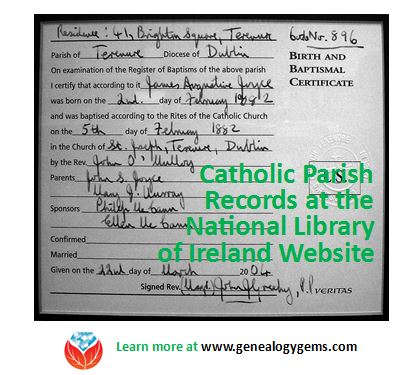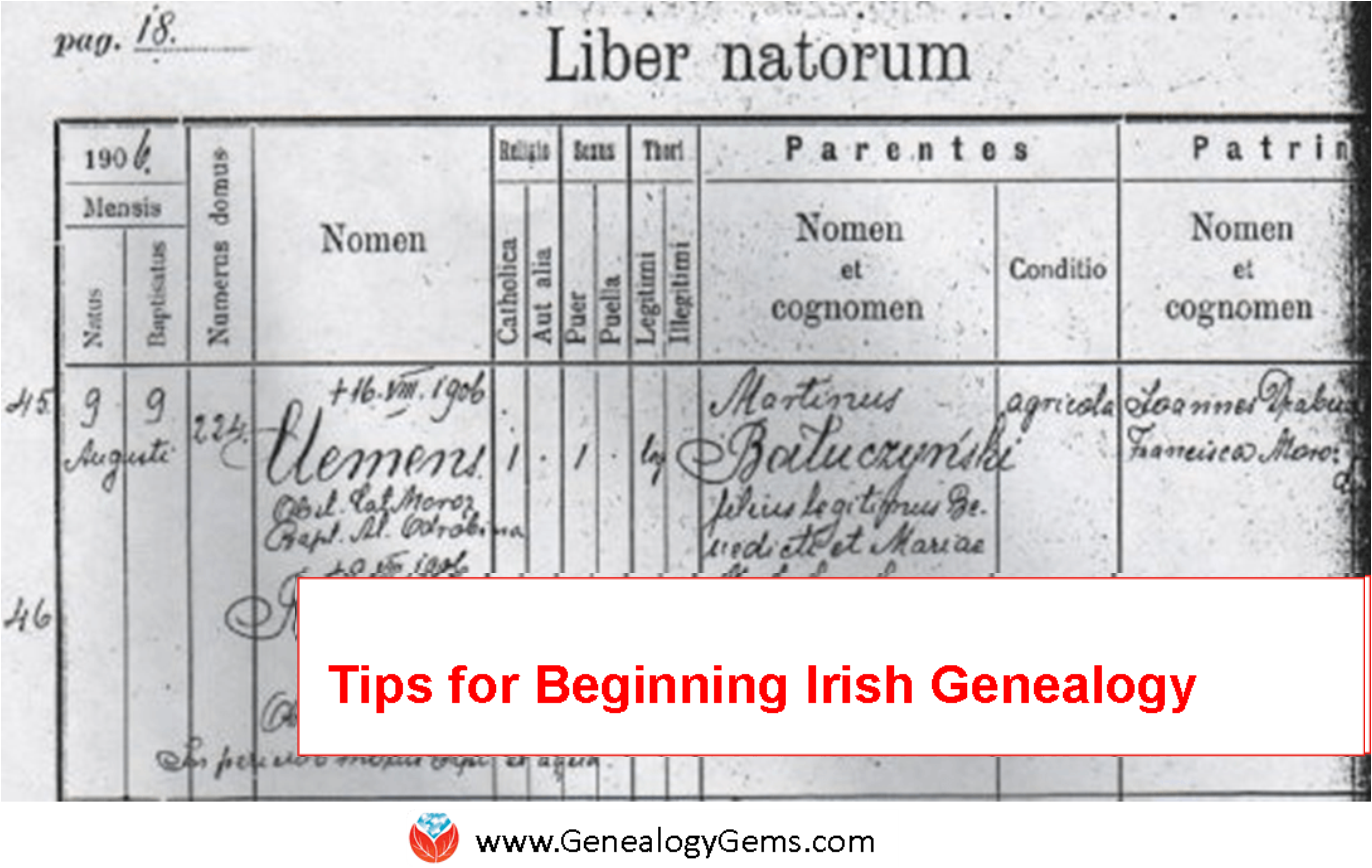by Lisa Cooke | Mar 1, 2016 | 01 What's New, Findmypast, Irish, Records & databases
Here are 3 essential tips for beginning Irish genealogy from Brian Donovan, Head of Irish Data and Development at Findmypast. Plus we’ll highlight Findmypast’s enormous collection of Irish records.
It’s March now, and time to start celebrating all things Irish! Findmypast.com is one of the best resources for Irish genealogy research, thanks to their enormous index of Irish Parish Records (1670-1900). The index has 40 million names from 1,000 parishes across all 32 counties of Ireland and links to digitized content at the National Library of Ireland.
According to Findmypast, parish records are “the most important resource for Irish ancestors prior to the 1901 census, allowing researchers to trace their roots back to Pre-Famine Ireland.” Let’s hear from Findmypast’s Irish research expert to help you get started in finding your Irish ancestors.
Beginning Irish Genealogy: Tips to Get Started
It can be intimidating to start researching Irish genealogy. I asked Brian Donovan, Head of Irish Data and Development at Findmypast, to answer 3 key questions: 
Q: How do I know if I’m ready to “cross the pond” back to Ireland? What information should I have?
A: Before looking through Irish records…you’ll want to know as much as you can about the origins of your immigrant Irish ancestor. Obviously you’ll need to know their name and date of birth, but the really key piece of information is their place of birth – that’s absolutely essential, especially if you have a common last name. At minimum, you would need to know the county, but knowing the parish or townland is even more helpful. With our new parish records, however, it’s much more possible to make progress knowing only the county. Additionally, knowing the names of other family members, such as their parents or siblings, buy hypothyroid medication will also help locate your Irish family before they left.
Q: What are the first Irish records I should search? Does that change by time period?
A: It definitely depends on the time period. If you know your ancestors migrated after 1901, that’s easy – start with the 1901 Census of Ireland. If they left Ireland prior to that, focus on the civil registers of birthsand of course the parish records. Civil registration began in 1864, so if they [left] before that, your best option is to look in the parish records and land records (like Griffith’s Valuation). This is why we’re so thrilled to be releasing these parish records: a huge portion of Irish emigrated before 1864, so prior to this release the only major record sets to work with were land records (though there are others that can be helpful too).
Q: What language or languages should I expect to encounter in Irish records?
A: Mostly English, but some parish registers are in Latin, the official language of the Catholic Church during the time period the records span. Irish was widely spoken and many people could only speak Irish, but the language was never used in official records.
More Irish genealogy resources:
Are you just beginning Irish genealogy? Find more great tips for getting started here. Book Club Gem: Suggested Read for Irish-Americans  The Story We Carry in Our Bones: Irish History for Americans by Julienne Osborne-McKnight. This book was recently recommended via the Genealogy Gems Book Club. According to the book description, this history begins in deep history with the Celts and Vikings. It explains the events that led up to the great potato famines, and follows the Irish exodus to the U.S., where she then traces Irish-American life. Click here to find more book suggestions for those who {heart} family history.
The Story We Carry in Our Bones: Irish History for Americans by Julienne Osborne-McKnight. This book was recently recommended via the Genealogy Gems Book Club. According to the book description, this history begins in deep history with the Celts and Vikings. It explains the events that led up to the great potato famines, and follows the Irish exodus to the U.S., where she then traces Irish-American life. Click here to find more book suggestions for those who {heart} family history.
by Lisa Cooke | Feb 19, 2016 | 01 What's New, Records & databases
Here’s our weekly roundup of new genealogy records online. Should you search for your ancestors in any of these databases?
BRITAIN, MERCHANT SEAMAN. Findmypast.com has added nearly a quarter million records to its 1918-1941 database of British Merchant Seaman.
IDAHO VITAL RECORDS. New indexes of Idaho births (1861-1911) and deaths (1938-1961) are now searchable for free at FamilySearch.org.
ILLINOIS DEATHS. Over 3.7 million records have been added to a free index of Cook County, Illinois deaths at FamilySearch.org. Cook County is home to the city of Chicago.
INDIANA CHURCH RECORDS. A new database of Indiana United Methodist Church Records (1837-1970) is available at Ancestry.com. According to the collection description, “The registers may contain baptisms, marriages, burials, memberships, and lists of clergy.”
(1837-1970) is available at Ancestry.com. According to the collection description, “The registers may contain baptisms, marriages, burials, memberships, and lists of clergy.”
IRISH BIRTHS, BAPTISMS AND MARRIAGES. Complementing recent online Irish parish records collections are two databases of Non-conformist church records (meaning those not in alliance with the Church of Ireland) now at Findmypast: births/baptisms and marriages.
ONTARIO BIRTHS. FamilySearch has added over 125,000 indexed records to its collection of Ontario, Canada birth records.
UNITED STATES and NEW ZEALAND ARTICLES. Findmypast.com has updated its PERSI database with over 45,000 new indexed entries and images. Ten publications spanning 1883-1984 include articles covering several New Zealand and several U.S. states, including Georgia, Maine, Massachusetts, Pennsylvania, and Utah.
VARIOUS MARRIAGE RECORDS. FamilySearch.org has published or updated several new free marriage records collections. Click here to see the full list, which includes British Columbia, Durham (England), Indiana, Kansas, Liberia, Louisiana, Maryland, Minnesota, Mississippi, Missouri, New York, North Carolina, Ohio, Oklahoma and Utah.
 Don’t see the records you hoped to among these new genealogy records online? Click here to read a blog post on two powerful tools to help you search for elusive records.
Don’t see the records you hoped to among these new genealogy records online? Click here to read a blog post on two powerful tools to help you search for elusive records.
by | Nov 13, 2015 | 01 What's New, Ancestry, FamilySearch, Irish, Italian, Records & databases, United States
 New genealogy records online this week includes civil registrations for Italy and the Philippines, Irish vital records indexes, Pennsylvania veterans’ files and even 20th-century U.S. merchant marines databases. Which may include your relatives?
New genealogy records online this week includes civil registrations for Italy and the Philippines, Irish vital records indexes, Pennsylvania veterans’ files and even 20th-century U.S. merchant marines databases. Which may include your relatives?
ITALY CIVIL REGISTRATIONS. Digitized (not yet indexed) civil registration records for Forlì-Cesena Forlì (1800-1815, 1866-1930) and Imperia Ventimiglia (1806-1913) are now free to view on FamilySearch. Records for each locale may vary, but in addition to civil registrations may include marriage banns, memorandums and marriage supplemental documents; annotations to death records and other miscellaneous records.
IRELAND VITAL RECORDS. Indexes to birth records (1864-1914), marriage records (1845-1939, but begins 1864 for Roman Catholic marriages) and death records (1864-1964) are now available to search at IrishGenealogy.ie.
PENNSYLVANIA MILITARY. Ancestry has posted a new database of Pennsylvania, WWI Veterans Service and Compensation Files, 1917-1919, 1934-1948 WWI Veterans Service and Compensation Files, 1917-1919, 1934-1948 and updated its Pennsylvania, Veteran Compensation Application Files, WWII, 1950-1966
WWI Veterans Service and Compensation Files, 1917-1919, 1934-1948 and updated its Pennsylvania, Veteran Compensation Application Files, WWII, 1950-1966 database.
database.
PHILIPPINES CIVIL REGISTRATION. About 1.8 million indexed images of Manila civil registrations (1899-1984) are now free to search on FamilySearch. This represents a partial index (just the births for 1900-1980).
U.S. MERCHANT MARINES. Ancestry recently posted two new 20th-century databases on merchant marines: the WWI-era U.S., Lists of Merchant Seamen Lost in WWI, 1914-1919 and the longer-spanning U.S., Merchant Marine Applications for License of Officers, 1914-1949
and the longer-spanning U.S., Merchant Marine Applications for License of Officers, 1914-1949 .
.
 Thank you for sharing these new genealogy records online with fellow genies and society members! We appreciate you helping us spread the good news. Didn’t find the records you’ve been pining for? Click here for a Google-based strategy on searching online for genealogy records.
Thank you for sharing these new genealogy records online with fellow genies and society members! We appreciate you helping us spread the good news. Didn’t find the records you’ve been pining for? Click here for a Google-based strategy on searching online for genealogy records.
by Lisa Cooke | Jul 31, 2015 | 01 What's New, Australian, Census, FamilySearch, Findmypast, images, Irish, Military, Records & databases, United States
 Every Friday, we blog about new genealogy records online. Do any collections below relate to your family history? Please share with genealogy buddies or societies that might be interested!
Every Friday, we blog about new genealogy records online. Do any collections below relate to your family history? Please share with genealogy buddies or societies that might be interested!
AUSTRALIAN CONVICTS. A variety of convict records for New South Wales and Queensland, Australia, are now searchable on Findmypast. The NSW records include certificates of freedom and death records beginning in the 1820s. Queensland data includes convict indexes from 1824-1936.
CALIFORNIA DEATHS. Over 2 million deaths in California from 1905-1939 are now searchable for free on FamilySearch. “The index is arranged alphabetically by the name of the deceased, initials of spouse, age, and date of death. Place of death or county of death is coded.”
IRISH COURT RECORDS. Nearly 22 million records appear in the new FamilySearch database, Ireland Petty Sessions Court Registers 1828-1912. According to FamilySearch, “Most records contains name, address, the date in court, and whether the person was a witness, complainant or defendant. It might also contain other information to the specific case. These records were originally filmed at the National Archives of Ireland and the index was created by FindMyPast.com.”
IRISH MILITARY. Ireland’s National Army Census of 1922 is now searchable at Findmypast. Taken in the midst of the Irish Civil War, it “includes details pertaining to where soldiers were stationed, their ages and their next of kin,” according to the collection description.
KENTUCKY VITAL RECORDS. Nearly 10 million names appear in the new FamilySearch index, Kentucky Vital Record Indexes 1911-1999. The database includes “indexes of births, marriages, and deaths from January 1911 to July 1999. These indexes were created by the Kentucky Department for Libraries and Archives from data files obtained from the Office of Vital Statistics.”

Here’s a tip: if you live far from your ancestors’ hometown, why not make a virtual visit? Google Earth is a powerful, free, interactive 3D map of the world. Use it to “fly” over a hometown or even drop down into a Street View that lets you see what’s there now. Maybe you’ll find an old home, neighborhood, school, courthouse, church, cemetery or other landmark relating to your family. Learn more in our free Google Earth for Genealogy video. Click here to watch it!
by Lisa Cooke | Jul 8, 2015 | 01 What's New, Church, Irish, Libraries, Records & databases

Writer James Joyce’s baptismal certificate; click to link to Wikipedia image.
As of today, the National Library of Ireland expects to launch a free, digitized collection of ALL its Catholic parish registers on its website (this link takes you to the English version; it’s also available in Irish). Nearly 400,000 digital images of microfilmed parish records comprise this collection.
According to a press release, “The parish register records are considered the single most important source of information on Irish family history prior to the 1901 Census. Dating from the 1740s to the 1880s, they cover 1,091 parishes throughout the island of Ireland, and consist primarily of baptismal and marriage records….Their digitisation means that, for the first time, anyone who likes will be able to access these registers without having to travel to Dublin.”
Catholic parish registers are a vital genealogical resource. In addition to the names of those baptized or married, they usually include those event dates, names of parents of baptized children, godparents and witnesses (who may also be relatives).
NOTE: This is a browsable-only collection. There are currently no plans to index or transcribe the records. However, the press release included a great suggestion for accessing indexes: look to local family history centers for that parish or neighborhood. “The buy diet medication online nationwide network of local family history centres holds indexes and transcripts of parish registers for their local areas,” it says.
 Those unfamiliar with Ireland research may assume this means local FamilySearch Family History Centers, but a map shows only a few of these in Ireland. I would start first with the network of county genealogy centers, accessible online at Roots Ireland. According to that site, “The county genealogy centres are based in local communities, working with volunteers, local historical societies, local clergy, local authorities, county libraries and government agencies to build a database of genealogical records for their county. By using this website you are supporting that work and the communities from which your ancestors originated.” Several counties actually already have online records you can access through the Roots Ireland link above. Ancestry also has several databases of Irish Catholic parish registers.
Those unfamiliar with Ireland research may assume this means local FamilySearch Family History Centers, but a map shows only a few of these in Ireland. I would start first with the network of county genealogy centers, accessible online at Roots Ireland. According to that site, “The county genealogy centres are based in local communities, working with volunteers, local historical societies, local clergy, local authorities, county libraries and government agencies to build a database of genealogical records for their county. By using this website you are supporting that work and the communities from which your ancestors originated.” Several counties actually already have online records you can access through the Roots Ireland link above. Ancestry also has several databases of Irish Catholic parish registers.
For more tips on researching your Irish relatives, listen to the FREE Family History Made Easy podcast episode 21, in which we interviewed Irish expert Judith Wight. You’ll hear her tips on finding Church of Ireland records, civil registrations, estate records and how history helps us understand gaps in the records.
Thank you for sharing this post with those who will LOVE to know about these Irish genealogy resources!













